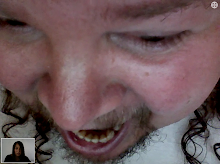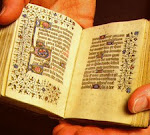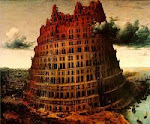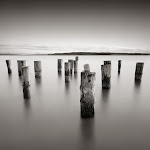I went to high school with a young rocker, V.A., who had considerable influence on me. I felt the impact of his personality and musical ability less in my own attitude and musical ability that in my understanding of relationships and what it is I was looking for in friends and heroes. I saw him as a creative peer and was drawn to befriend him because of this, but in reality our creative powers were really not that similar. What struck me most was his confidence, which as a teenager was remarkable. It remains unclear whether his confidence stemmed from his prodigy-like talent or if the talent was unlocked by his disarming confidence. I had hopes it was the latter and that I would discover how to unlock my own dormant musical ability by leveraging my own confidence, which was thin but more developed than many of my peers. Our friendship was brief and intense, not the least because I wasn't much of a musician, but in that brief space I gained more front and center insight from him than from any other another person to that point.
I recently watch a program in which Neil Peart, one of my intellectual idols from the same time, was discussing role models and whether society was 'getting dumber.' He was on a talk show. He commented that he didn't think human nature changed so much as the social environments against which we measure ourselves and that people look up to heroes and role models in the media and literature because they want to be smarter or better, whereas the obsession with stupid television is not a result of society having become dumber, but that we are less threatened by examples of people who are clearly not as smart as we are. We get affirmation through negative stereotypes, seeing that we are smarter than, say, Beavis and Butt Head, or at least not as dumb as many others who have prominent roles in the abstract world of media. I think this speaks volumes about how our identity take shape when we are young including our the social groups we hang out with and the influences that touch us from outside our immediate experience.
Young people naturally have a desire for an elevating experience, for the opportunity to enter into the world of a person or group that is obviously smarter than we are to somehow become smarter or better ourselves. In traditional societies, such experiences are often forced upon us when we enter adulthood. In our contemporary society, the voluntary nature of this exchange is highlighted. To seek out intelligent or 'high culture' requires a bit of self abnegation, a kind of vulnerability that opens us up to thinking and reflecting. It is the exact opposite of seeking identity with the like minded or security with those who are clearly below us in some way, even if only though prejudice and insularity. Because our fragmented society with a plurality of values and ethics is less capable of helping individuals meet basic self esteem needs, affirming ourselves against the dummies plays an absurdly important role in both forming (and arresting the formation) of our identity when we are young. This is why V.A. was such a compelling figure, because he clearly had talents that were unusual which I wanted to associate with and emulate, but he was at the same time a peer, not an abstract hero from a record sleeve or the sound bits of an interview on the news.
V.A. could really play guitar. He could hear something and then play it. He preferred to create his own music, but he drew inspiration from many sources. In was struck by the fact that he could literally play any instrument, that he could puck up an instrument and, with a few minutes of fiddling, could not only play it but he could bend its voice to his own. He could make it do what he wanted. There was no gap between his hearing, his mind and his ability to physically control the guitar. For anyone who has ever tried to play an instrument, seeing this in another person is a revelation. For him, there were no obstacles to musical expression except that which he couldn't yet conceive in his mind or hadn't heard before. This kind of talent has a magnetism that speaks for itself and V.A. was surrounded by friends and admirers.
With the exception of a few other good musicians, the people who hung out with V.A. were mostly beneath him, though. My own status was uncertain - clearly he saw me as a peer in a creative sense, but musically I was as much a turd in the tub as the next guy who couldn't play guitar at all. Our relationship dissolved when it became obvious to me that my musicianship couldn't add much to his experience and that we didn't really have much in common otherwise. My admiration became awkward jealousy in the face of my lack of talent.
Still, there were great moments of illumination. He was constantly practicing, making it look so effortless. More than this, he was focused on music, whereas I was still very undecided and guarded about what I wanted to give myself to. Seeing this contrast was very important and edifying, although it made me feel weak and vulnerable in a way I didn't really understand. Also, V.A. never criticized my playing, even when I knew it was really shit. I had a good creative sense of the possibilities in music, but a very poor sense of rhythm. I simply couldn’t keep time with other musicians. I don't know what motivated his magnanimity, but it came off as a kind of brotherly acceptance and patience. This had an encouraging and even empowering effect and was perhaps the first unspoken trust I shared with another person. To me, this was a sign if his real genius. I have since found it in others, but it is rare nevertheless. Finally, he was just very open to music of all kinds and this contrasted my own insecurity with new things. He had his own taste, but could see something valuable in anything - classical, country, rap, whatever. Given his otherwise juvenile behavior and outlook on life, this musical maturity was all the more impressive and influential. These attitudes set the tone for my understanding of musicianship and represent one of the most important learning experiences in my life, even now. I have struggled on and off to be a better musician most of my adult life, but despite my failure to achieve the level of proficiency that I desire, I have a solid inner vision of what it means to be and what it will take to be a good musician.
When we were alone together in one moment of unusual stony lucidity near the end of our time hanging out together, I asked him how he just 'knew what to do' when playing and how I could learn the 'rules' of music to express myself more freely. His advice, though existentially dark, was nevertheless profoundly liberating. It has followed me ever since.
He simply replied, 'There are no rules.'
Greek Style Black Eyed Peas
3 weeks ago









No comments:
Post a Comment